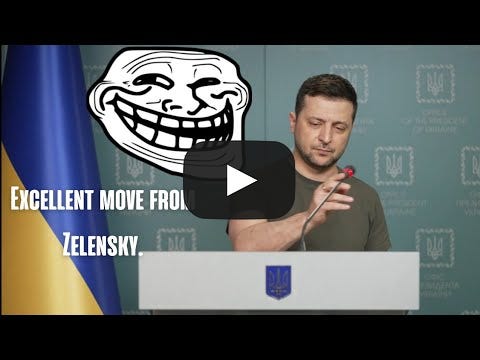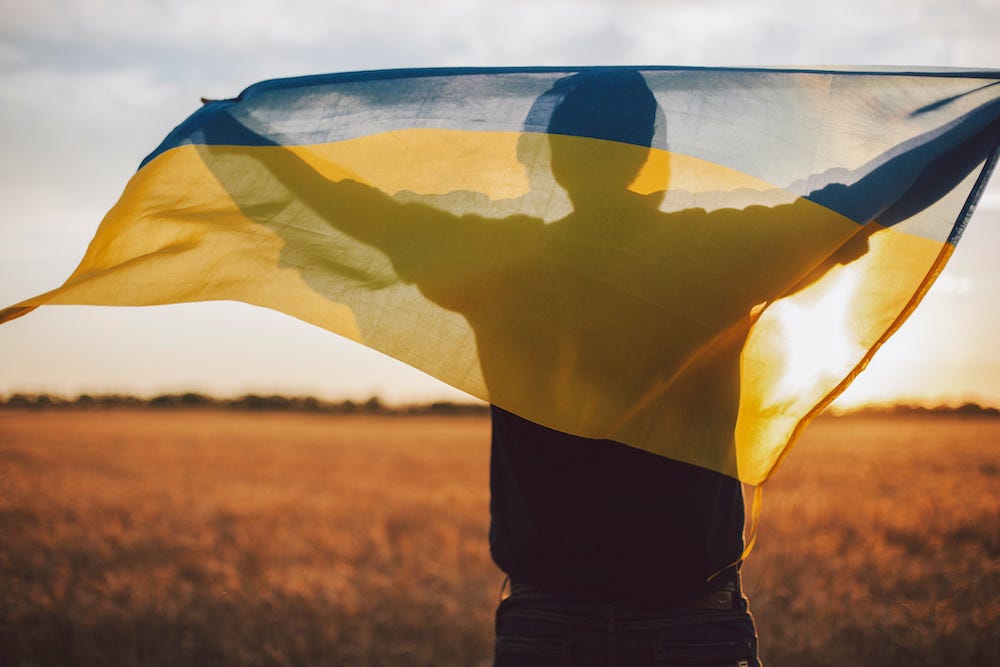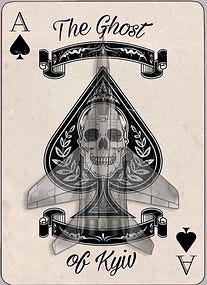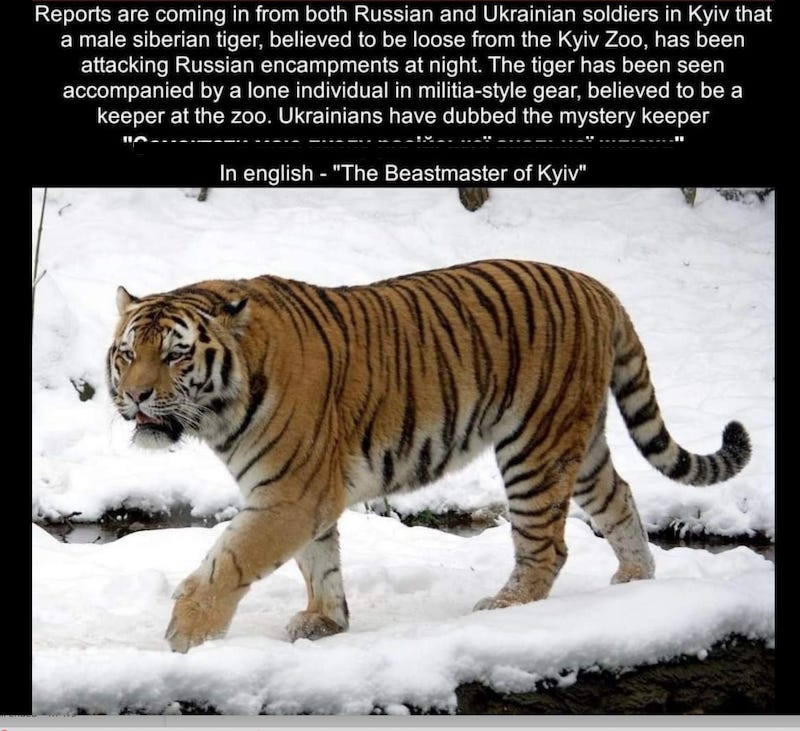Story Cauldron - Winning a war through storytelling?
Thanks for reading Story Cauldron, where I investigate stories and storytelling. If you enjoy what you’re reading, please consider sharing this newsletter with a friend. Winning a war through storytelling?The role of stories and propaganda in the Russian invasion of UkraineIn this week’s Story Cauldron, I explore the concept of propaganda as a form of storytelling and how it is playing out in real-time in Ukraine. It’s almost impossible to escape news about what is going on in Ukraine. But what is true? This week let’s look at a few pieces of propaganda that have come out of the war so far, and how this form of storytelling is powerful and can change the opinions of millions. And in a war watched so closely on social media, the victor may end being a case of who tells the better story over time. The basicsAs you probably know, Russia invaded Ukraine on February 24th. Since that day, the Russian forces have been bombing Ukrainian cities and the countryside, mining the roads, and attacking both military and civilian targets. By all accounts it has already been quite devastating to the Ukrainian people, nearly 2 million of whom have fled the country while millions more are hiding in basements, bunkers, or out in the country. It’s important to note that Ukraine is not a small country. It’s 233,062 sq. mi. in size, just a bit smaller than Texas (at 268,597sq. mi.) and larger than France (210,016 sq. mi.). The population of Ukraine is 40 million, far more than the 29 million in Texas. The country has many large cities—Kyiv is larger than the St. Louis metro area—and many of the people are well-educated, have advanced technical skills, and speak multiple languages, including Ukrainian, Russian, English, and others. What’s really happening in Ukraine?Ah, that’s always the million-dollar question, isn’t it? To hear Russia tell it, they are trying to wrest back control of part of their country from neo-Nazis who are attacking their own people. That is the official story being shared by Russian news outlets within the country. The problem is, there’s no evidence of truth in that story, especially since the Ukrainian president, Volodymyr Zelenskyy, was born to two Jewish parents and is the furthest thing from a Nazi. Meanwhile, Ukrainians claim Russia invaded their democratically-governed, independent country and are now waging unprovoked war against civilians, with apartment buildings, bridges, civilian government buildings, and other structures destroyed. Russia has also bombed a nuclear power plant and has been holding the staff at Chernobyl hostage for days. This is the accepted truth within Ukraine, the US, the UK and EU, and most of the world outside Russia itself. I feel confident in that analysis not just because of what I see in the mainstream media (which is not devoid of propaganda) but because I work with many Ukrainians who remain in the country. I’ve witnessed how many of their lives have been destroyed by this conflict, and how they remain in danger of violence and dwindling supplies. No matter what Russia argues, it’s safe to say this isn’t Ukrainians fighting Ukrainians with Russia coming to assist. I mention all of this because some countries—and some right-wing ideologues—continue to cast the war in a different light, in deference to Russia. You’ll find these trolls all over social media. Propaganda as storyRussia has long portrayed itself as a superpower, mighty and worthy of being feared. Their story—one that most across the world have believed—is that they are undefeatable. Yet in the two weeks of the invasion, they have failed to take Kyiv—much less the country—or locate President Zelenskyy in order to assassinate him and replace him with a puppet ruler. Lots of people have recounted the Russian losses, evidence of ineptitude, poor planning, failed equipment, and the like. For Putin, a leader many have long feared, it is an astonishing failure. Are these stories true, and is it the best Putin can muster? Is he holding back? What’s really going on here? This is a difficult question to answer definitively. In her March 7 dispatch, renowned American historian Heather Cox Richardson alluded to the problems of sorting fact from fiction. Former Russian foreign minister Andrey Kozyrev suggests that while Russia spent billions on their military, much of that money was embezzled and spent on yachts—but no one dared tell Putin:  The other story Putin wants everyone to believe is that he will stop at nothing—even nuclear war—to win. That story stops most of us in our tracks. We want to help Ukraine… but at what cost? Kozyrev has an answer to that as well:  This is an important note. If Putin is already threatening nuclear weapons, many analysts suggest, it’s a bluff and it means he knows he cannot win the war and has to resort to fear tactics to try to command the upper hand in negotiations. Finally, there’s an argument that Putin chose to believe stories that the US under Biden was weak—after all, we couldn’t even get out of Afghanistan gracefully. This story posits that he didn’t expect the US to be able to lead the world in standing up to Putin. In other words, he believed Republicans’ propaganda that Biden was weak. As Kozyrev notes:  Taken as a whole, it appears that Putin failed to take control of the early story of the Ukraine War, and may have been a victim of his own propaganda and that of his allies.
Meanwhile, the news is flush with stories of Ukrainian heroism. Early on we heard about the Ghost of Kyiv, which is the nickname given to a MiG-29 Fulcrum flying ace who the Security Service of Ukraine claims has shot down 10 Russian jets as of 27 February. Then there are all the stories and memes about Zelenskyy himself—his bravery and willingness to remain in Kyiv to support his people. Here’s a video that does a great job at demonstrating some of the ways in which Zelenskyy is dominating American storytelling, and how he has become a hero all around the world—a rather critical thing when you’re fighting a war of independence and self-determination and want outside support.  (Oh and while we’re on the subject, even names have power. Use Kyiv (keev,) the Ukrainian name for the city, rather than Kiev (key-ev) the Russian name for the city.) The Beastmaster of KyivThen there’s this story that hit my inbox today: The text of the meme reads:
I can’t find anyone analyzing the story yet, but let’s just assume for now that it’s fake. For one thing, there’s a line in Ukrainian that’s translated as “The Beastmaster of Kyiv”— but instead is a crude curse to the Russians that involves degrading language about sucking a part of a woman’s anatomy. With that debunked I think it’s safe to say the story is likely untrue. But as propaganda, the story is amazing. How better to spread the tale of Ukrainian heroism than to talk about a Siberian tiger, with its symbolism of cunning and strength, attacking Russians? As the tiger also comes from Russia, it also carries an underlying message of betrayal—even Russia’s own tigers are against them. And the inaccurately translated curse that almost ensures it travels the world unscathed isn’t a bad touch. Honestly, to me the meme is brilliant. This is how legends are born. How propaganda worksSo what’s going on here? Propaganda is simply storytelling that’s designed to evoke an emotion and either instill pride and hope or fear, depending on which side you’re on. The Ghost and Tiger stories both portray Ukrainians as freedom fighters, as people willing to do dangerous things in the name of their country’s defense, while sending a clear message to Russians that they cannot possibly win in the face of such heroism. Meanwhile, the stories of Russian ineptitude are both to encourage Ukrainians and demoralize Russians, assuming such news ever reaches them. The magic of propaganda is that anyone can create it, and as such, it can be a wicked tool in the guerilla war against a larger opponent (as well as a way to obfuscate the truth, which is why it is so important to guard against sharing misinformation). Here’s a silly but instructive example of how a single person and piece of propaganda can have an outsized impact. Over 15 years ago I played an online zombie game called Urban Dead, which was a simple text turn-based game that killed a few minutes every day (not unlike Wordle nowadays). Your goal was to try to fight zombies and stay alive in safehouses with other humans. If you got bitten by a zombie, you would have to play as a zombie until revived. It was pretty boring in itself, but the real game came from participating in a forum set up for the players. I didn’t think much about the game until a group of hardcore gamers swarmed the game, became zombies, and then killed as many humans as possible, completely upsetting the balance of the game. Frustrated, I created an organization called the Shearbank Liberation Army and created a series of dispatches that I published anonymously on Blogger. I made it sound like there were a whole bunch of us in the group—matching, more or less, the number of players in the other group and got a handful of players to help me spread the illusion in-game by putting up graffiti in different spots. And in doing so, I completely disrupted the tactics of the other players and changed the trajectory of the game, giving individual players motivation to form their own groups. The point is, the efforts of a single person changed the dynamics of a powerful enemy, and their fear of an organized resistance made the game a lot more fun for the rest of us. Ukrainians are good at social mediaAs we have seen from President Zelenskyy himself, and thousands of others in Ukraine, they know the value of a good meme or joke, as well as how important it is to get their version events out there quickly. Over the past few days, this video has been making the rounds of Twitter and Facebook:  The video suggests Putin was faking a public appearance, with the proof being his hand appearing to move right through the microphone, and then Zelenskyy made his own appearance where he made a show of moving the mic, proving he was in fact doing the press appearance live and at that location and therefore subtly trolling Putin. Snopes has so far failed to ascertain if this is in fact what’s going on in the video, but again, does it matter? People believe it. They see a man under siege, and with every reason to fear for his life, still taking the time to make jokes. In another example, there’s the Hello, My Russia Mom project that airs Russian confessions about their involvement in the war. There’s no way to verify that these are real Russian soldiers or that their confessions are real, but it does reinforce the story being told in mainstream media that the soldiers didn’t know where they were going and don’t want to be there now. To the best stories go the spoils?Wars have always been fought with military might—missiles and bombs and Molotov cocktails—and propaganda has had a role probably since the beginning of time. But as information is easier to get and share, wars may soon be won not with armies and explosives but through storytelling—with the winner being the one that wins the war of information. On that note, allow me to leave you with a video shared with the company tonight My colleague described as a cover/adaptation of "Bella Ciao" sung by Ukranian singer Khrystyna Soloviy. As he put it,
It’s well worth the watch—and be sure to follow along with the English in the captions (when she referred to the Russians as “darklings,” as a Leigh Bardugo fan I had a shiver run down my spine.)  Slava Ukraini! So can stories win a war? Let me know in the comments. You’re on the free list for Story Cauldron. For the full experience and to be the first in the world to read my next novel, consider becoming a paying subscriber. |
Older messages
That was then, this is now
Friday, February 25, 2022
Reflections on where I grew up—and what's there today
Winter in St. Louis
Thursday, February 10, 2022
An update on our snowfall—and photos from around town
Let it snow, let it snow, let it snow
Wednesday, February 2, 2022
My lifelong passion for snowy winter days
Untangling a knotty mess
Tuesday, January 25, 2022
The future of one newsletter and the creation of another
What would you like to see in Story Cauldron?
Sunday, January 23, 2022
For a while now, I've been considering changing up how I do things here on Story Cauldron. Initially, this was just supposed to be a periodic ne…
You Might Also Like
Closing Tonight • Black Fri TO CyberMon Book Promos for Authors
Sunday, November 24, 2024
Book Your Spot Now to Get Seen During the Busiest Shopping Season of the Year! "ContentMo is at the top of my promotions list because I always
What it feels like
Sunday, November 24, 2024
Plus, an AI newsletter tool and how to create higher-converting buttons ͏ ͏ ͏ ͏ ͏ ͏ ͏ ͏ ͏ ͏ ͏ ͏ ͏ ͏ ͏ ͏ ͏ ͏ ͏ ͏ ͏ ͏ ͏ ͏ ͏ ͏ ͏ ͏ ͏ ͏ ͏ ͏ ͏ ͏ ͏ ͏ ͏ ͏ ͏ ͏ ͏ ͏ ͏ ͏ ͏ ͏ ͏ ͏ ͏ ͏ ͏ ͏ ͏ ͏ ͏ ͏ ͏ ͏ ͏ ͏ ͏ ͏ ͏ ͏ ͏
🌱UNESCO x Dior mentorship program, Funded internships at UNICEF, Education visa to Netherlands
Sunday, November 24, 2024
The Bloom Issue #192, Nov 24 ͏ ͏ ͏ ͏ ͏ ͏ ͏ ͏ ͏ ͏ ͏ ͏ ͏ ͏ ͏ ͏ ͏ ͏ ͏ ͏ ͏ ͏ ͏ ͏ ͏ ͏ ͏ ͏ ͏ ͏ ͏ ͏ ͏ ͏ ͏ ͏ ͏ ͏ ͏ ͏ ͏ ͏ ͏ ͏ ͏ ͏ ͏ ͏ ͏ ͏ ͏ ͏ ͏ ͏ ͏ ͏ ͏ ͏ ͏ ͏ ͏ ͏ ͏ ͏ ͏ ͏ ͏ ͏ ͏ ͏ ͏ ͏ ͏ ͏ ͏ ͏ ͏ ͏ ͏ ͏ ͏ ͏ ͏ ͏ ͏ ͏
Food for Agile Thought #470: A Short Overview of PM Tools, Product Strategy and Clarity, Bayer’s Bold Bet, Delivering Bad News
Sunday, November 24, 2024
Also: The Brilliant Jerk, POM When Agile Failed? Example Mapping, Discovery Done Right ͏ ͏ ͏ ͏ ͏ ͏ ͏ ͏ ͏ ͏ ͏ ͏ ͏ ͏ ͏ ͏ ͏ ͏ ͏ ͏ ͏ ͏ ͏ ͏ ͏ ͏ ͏ ͏ ͏ ͏ ͏ ͏ ͏ ͏ ͏ ͏ ͏ ͏ ͏ ͏ ͏ ͏ ͏ ͏ ͏ ͏ ͏ ͏ ͏ ͏ ͏ ͏ ͏ ͏ ͏ ͏ ͏
Closes Tomorrow • Black Fri TO CyberMon Book Promos for Authors
Sunday, November 24, 2024
Book Your Spot Now to Get Seen During the Busiest Shopping Season of the Year! "ContentMo is at the top of my promotions list because I always
Kindle & Audiobook : Santa's List: A Short Christmas Story by Riley Blake
Saturday, November 23, 2024
They have big plans for an international killer with an impeccable reputation for always hitting his mark.
Ask your way to product market fit
Saturday, November 23, 2024
Use the Sean Ellis Method and the 40% Test ͏ ͏ ͏ ͏ ͏ ͏ ͏ ͏ ͏ ͏ ͏ ͏ ͏ ͏ ͏ ͏ ͏ ͏ ͏ ͏ ͏ ͏ ͏ ͏ ͏ ͏ ͏ ͏ ͏ ͏ ͏ ͏ ͏ ͏ ͏ ͏ ͏ ͏ ͏ ͏ ͏ ͏ ͏ ͏ ͏ ͏ ͏ ͏ ͏ ͏ ͏ ͏ ͏ ͏ ͏ ͏ ͏ ͏ ͏ ͏ ͏ ͏ ͏ ͏ ͏ ͏ ͏ ͏ ͏ ͏ ͏ ͏ ͏ ͏ ͏ ͏ ͏ ͏ ͏
The end of productivity
Saturday, November 23, 2024
Has AI made this obsolete? ͏ ͏ ͏ ͏ ͏ ͏ ͏ ͏ ͏ ͏ ͏ ͏ ͏ ͏ ͏ ͏ ͏ ͏ ͏ ͏ ͏ ͏ ͏ ͏ ͏ ͏ ͏ ͏ ͏ ͏ ͏ ͏ ͏ ͏ ͏ ͏ ͏ ͏ ͏ ͏ ͏ ͏ ͏ ͏ ͏ ͏ ͏ ͏ ͏ ͏ ͏ ͏ ͏ ͏ ͏ ͏ ͏ ͏ ͏ ͏ ͏ ͏ ͏ ͏ ͏ ͏ ͏ ͏ ͏ ͏ ͏ ͏ ͏ ͏ ͏ ͏ ͏ ͏ ͏ ͏ ͏ ͏ ͏ ͏ ͏ ͏ ͏
Setting Gift-Giving Guidelines for a Minimalist Holiday Season
Saturday, November 23, 2024
Setting Gift-Giving Guidelines for a Minimalist Holiday Season A question I frequently hear from readers aspiring to live a more minimalist holiday season goes like this: “How do you handle holiday
[Electric Speed] Blind spots | Bluesky
Saturday, November 23, 2024
Plus: advent calendars | holiday cards ͏ ͏ ͏ ͏ ͏ ͏ ͏ ͏ ͏ ͏ ͏ ͏ ͏ ͏ ͏ ͏ ͏ ͏ ͏ ͏ ͏ ͏ ͏ ͏ ͏ ͏ ͏ ͏ ͏ ͏ ͏ ͏ ͏ ͏ ͏ ͏ ͏ ͏ ͏ ͏ ͏ ͏ ͏ ͏ ͏ ͏ ͏ ͏ ͏ ͏ ͏ ͏ ͏ ͏ ͏ ͏ ͏ ͏ ͏ ͏ ͏ ͏ ͏ ͏ ͏ ͏ ͏ ͏ ͏ ͏ ͏ ͏ ͏ ͏ ͏ ͏ ͏ ͏ ͏ ͏ ͏




